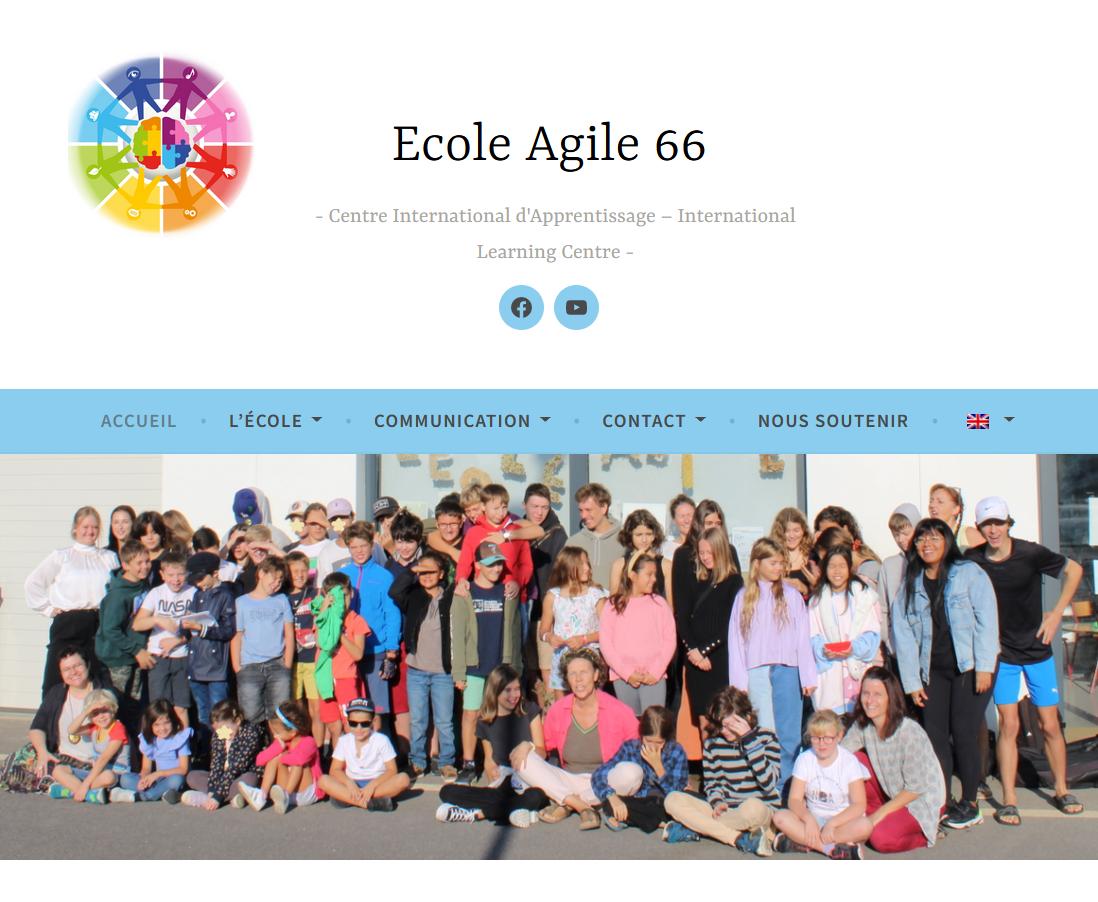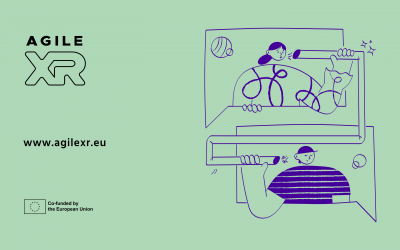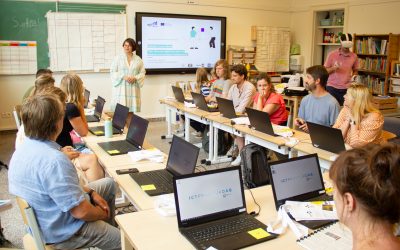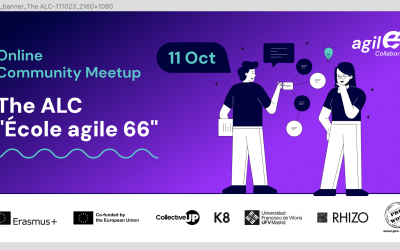Our agile handbook is finalized! We are now entering phase 2 of the project “Agile4Collaboration”.
We have therefore started a series of interviews with Agile actors active in the four corners of Europe.
Our journey – only digital, unfortunately! – first took us to France where we had the pleasure of talking to Marianne Masson-Delcombel.
Marianne is the founder of the School “École Agile 66” in Perpignan (France). She has been working as a manager in a company for 30 years and practiced agile project management methods that place people at the heart of project success. Her passion for the role of neuroscience in supporting educational processes and her experiences as a mother of two children led her to create an innovative democratic school based on Agile principles in 2017. In this school, education and learning are self-directed. Children and teenagers define the nature and form of their learning themselves, and learn at their own pace. They are guided and accompanied by a particularly committed team of facilitators with varied and complementary profiles.
Our conversation – far too short, as there is so much to listen to, to discover, to share – included the following aspects:
- What does agile learning mean to you? How is it a source of joy?
- What concrete tools do you use on a daily basis?
- Who are the facilitators and how did they become facilitators?
- What contribution could the “Agile4Collaboration” project make?
We summarize Marianne’s answers here and invite you to listen to the podcast “When the principles of Agility become the heart of a school”, in which other questions are also addressed (for French speakers!).
The Agile 66 school in 3 sources of satisfaction and joy:
For Marianne and her team, agility is a great source of joy. But what are the particularities of this method at the origin of this deep feeling of satisfaction? Marianne chooses to mention 3 of them:
- 1. autonomy:
“The greatest source of joy is the autonomy that the agile method offers to children. About 50% of the children are completely autonomous in their learning. This is a real success and for us a great source of joy.”
- 2. agile mindset: we have the right to make mistakes and the duty of transparency:
“Within the school, there is a mindset that is very caring. People evolve at their own pace and in complete serenity.”
- 3. freedom of speech:
“At Agile School 66, there is a great deal of freedom of speech for the children. We feel that there is no hierarchy between the adult and the child. This freedom of speech allows the child to teach things to us, the adults. This creates a true learning community that creates a sparkle of intelligence.”
Tools used in the agile school 66 :
While Marianne is well aware of the existence of Agile Learning Centers and their methods, she and her team decide themselves, internally, on the tools and methods they use to support children and teenagers in their learning. They willingly draw on concepts from different pedagogies. Marianne mentions these in her non-exhaustive list:
– the Freinet pedagogy, a pedagogy based on the free expression of children: free text, free drawing, inter-school correspondence, printing and student newspaper, etc.;
– the Singapore math, a method of teaching mathematics using three fundamental aspects: modeling, the “concrete-imagined-abstract” approach and verbalization;
– the Montessori pedagogy, which is based on the sensory and kinesthetic education of the child;
and more concretely, tools such as explanatory videos, mind maps, brainstorming, web applications for language-learning, board games. Anything that may help the student learn is relevant.
“In fact, the methods too, are agile. Each person can bring what they want in terms of methodology. There are not necessarily dedicated tools.”
Students are divided into 3 autonomy groups within which they progress:
– green group: students are totally autonomous in their intentions and learning;
– orange group: students are supported in defining their intentions, but learn independently;
– yellow group: students participate in guided workshops.
Unlike the classic democratic school, which emphasizes the individual and excludes educational intention, the agile school emphasizes collaboration and fully assumes that the child is influenced by its environment.
“There is a difference in view between democratic schools and agile learning centers. The democratic school favors individualization, the agile learning centers favor cooperation and collaboration. In the democratic school, there is a complete ban on pedagogical intentions, which could influence the child and spoil the development of the child’s individuality. It’s very “purist”, let’s say. We preferred something more compatible with the French model, with the social constraints, because there was nevertheless an observation of failure on what the democratic school was, where the children said after several years: “I didn’t learn anything” and finally felt devalued and out of step with the other children. We wanted to provide more guidance. Influence is always there, whether we like it or not, and it can be totally positive!”
Facilitators:
“There is no typical profile of a facilitator, except for soft skills. This is fundamental. There are no rules about the qualifications of facilitators.”
A question has been burning in our minds ever since we went to the presentation of the team on the agile school website (link to the website) and marveled at the diversity of profiles. But based on what criteria are the facilitators recruited? How are they trained in this pedagogy?
Marianne’s answer can be summed up in one sentence: “Recruiters are recruited mainly based on their soft skills. In order to form a solid team with diverse and complementary skills, the entire team has taken personality tests such as “Via” and “Gallup”.
They then train in immersion, spending time at the school observing, experimenting, exchanging, and using the school’s Agile Book, an essential resource. This Agile Book contains information about learning intentions, the common core of competencies, a self-evaluation booklet, the democracy modalities of the Agile 66 school, etc. “The Agile Book is the common thread of everything that happens in our school. It evolves every year.”
What we could still create and develop…
At our request, Marianne shared with us some of the challenges that students face and for which our project will try to propose avenues:
– the question of learning sources: how do I find these sources?
– the question of evaluation: how do I know if I have integrated what I have learned?
– the question of feedback: how can I share my learning with others?
– the question of tools for sharing the benefits of agility: how to make students hear the voices of agility actors. E.g.: I use the agile method in my professional context, and I get such and such benefits/satisfaction from it.
We took note of all this; now let’s get to work!
It was a pleasure to meet Marianne and her vision for the school of tomorrow. She has kindly agreed to take a look at our agile manual once it is finalized. Thank you so much, Marianne, for offering us your time, expertise, and experience!
For our next article, we will go to the German-speaking part of Switzerland to meet another agile actor: Christoph Frei is committed, together with his colleague Guido Koch, to the design of “toolkits” allowing teachers to dive quickly and productively into agile methods.











0 Comments